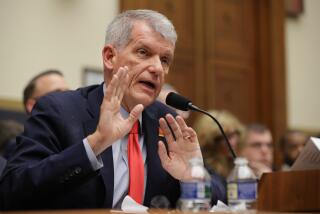Lay’s Claim of Forced Stock Sales Is Attacked
- Share via
HOUSTON — The government Monday attacked former Enron Corp. Chairman Kenneth L. Lay’s long-standing claim that his sale of $70 million of Enron stock in 2001 -- the year the company collapsed -- had been forced by his lenders.
Federal prosecutor John C. Hueston showed that on several occasions that year, Lay chose to sell large amounts of Enron stock when he could have avoided doing so by juggling bank borrowings or selling some of the millions of dollars of other investments he owned.
Hueston also contended that Lay ignored written warnings from a number of employees that year -- not just from the celebrated whistle-blower Sherron S. Watkins -- that something was amiss with Enron’s accounting and its obsession with meeting the earnings forecasts of Wall Street stock analysts.
The issues arose during Lay’s fifth day on the witness stand and his final day of cross-examination. Lay, 64, and former Enron Chief Executive Jeffrey K. Skilling, 52, are accused of lying to the public about Enron’s financial well-being and conspiring with others to hide losses and falsely inflate profit.
In response to an employee’s question in an online forum Sept. 26, 2001, Lay said that he had recently bought some Enron stock and considered it “an incredible bargain at current prices.” In fact, on Aug. 21, he had purchased about $2 million of shares by exercising some options he held, according to exhibits in the trial.
However, between Aug. 20 and Sept. 6, 2001, Lay had sold $20 million worth of stock back to the company, one in a series of sales that year, using the proceeds to pay down margin accounts, or bank lines of credit secured by more of his Enron stock. As Enron’s stock price declined that spring and summer, Lay testified that he was barraged by “margin calls,” or bank demands that he put up more collateral or face having the bank sell the stock.
But Hueston, using bank and brokerage documents, pointed out that during that period, Lay still had more that $7 million of available credit on his bank lines, plus nearly $7 million in non-Enron securities in several brokerage accounts.
Hueston suggested that Lay sold stock back to the company rather than let his banks sell the collateral because the latter type of sales had to be made public each month, whereas sales to the company had to be reported only once a year. That way, Hueston said, the public would have no way of knowing until the following year that Lay had unloaded more that half of his Enron holdings during 2001.
Lay insisted that he complied with all legal disclosure requirements. And he has testified that he drew a distinction between “forced” and voluntary stock sales and that he didn’t consider it dishonest to overlook forced sales when discussing his personal stock activity with employees. He said his goal was always to sell as little of his Enron stock as possible.
Hueston said that Lay had another option to avoid selling his Enron shares: He could have cut back on his spending. Hueston introduced evidence that in 2001 Lay had chartered a yacht for nearly $200,000 for his wife’s birthday, had stayed at resorts in the French Riviera and Utah and had gone antique shopping on the Mediterranean resort island of Majorca.
Lay said it was unfair of Hueston to examine lavish spending from early 2001, when nobody had an inkling of trouble at Enron. He said he had long acknowledged enjoying “the type of lifestyle that’s very difficult to turn on and off like a spigot.”
Lay also said the prosecutor was unfairly using hindsight to criticize him for overlooking warnings about aggressive accounting that came in an anonymous employee survey and in other communications from employees in the fall of 2001. Hueston cherry-picked negative remarks from the survey and ignored the far more numerous positive comments, Lay said. He added that he had much more on his mind in trying to run the company as it skidded toward crisis in October and November.
“The corpse is on the gurney now, Mr. Hueston, and you’re carving it up any way you want to carve it up,” Lay testified, “but I didn’t have that luxury when I was out there fighting the battle.”
Lay continued to show some impatience with Hueston but exhibited less of the sarcasm he showed during cross-examination last week.
At one point, Hueston said that because he was discussing Lay’s financial choices during 2001, he thought it fair to examine some of his expenditures.
“I’m not sure if it’s fair or not,” Lay replied, “but I’m sure you’re going to go there.”
The defense is expected to rest as early as Monday. The prosecution would then present a two- or three-day rebuttal, followed by closing arguments from both sides.
More to Read
Inside the business of entertainment
The Wide Shot brings you news, analysis and insights on everything from streaming wars to production — and what it all means for the future.
You may occasionally receive promotional content from the Los Angeles Times.










